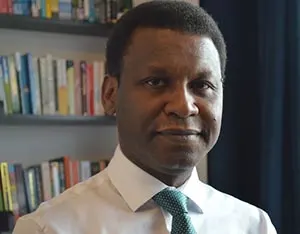Climate migration is coming — how can we mitigate the impact?
22 de marzo de 2022
Por Ian Evans

Climate migration will have a major impact on global health; here’s what Lancet Migration recommends
Dr Jocalyn Clark, Executive Editor of The Lancet, talks about Lancet Migration — a global collaboration to advance migration health. There are many reasons someone may choose to migrate. It might be for a job, a different living environment, or family. It might be because of persecution, war, or other social or political reasons. It may be a complicated mix of factors.
With a billion people on the move annually, what’s clear is that migration is a global reality.
Adding to that mix is climate change. In its 2021 Groundswell 2.0 report, the World Bank estimates that more than 216 million people could move within their countries by 2050 across six regions. Hotspots of internal climate migration could emerge as early as 2030 and continue to spread and intensify by 2050.
Fortunately, we have a growing will to take action.
Two initiatives from within Elsevier — Lancet Migration and the Pathways to Net Zero report — indicate that these trends can be managed and mitigated through, among other things, international collaboration that foregrounds the role of the Global South.
The migration estimates provided by the World Bank are reflected in the work done by Elsevier journal The Lancet as part of its global collaboration to advance migration health, called Lancet Migration. Dr Jocalyn Clark, Executive Editor of The Lancet, explained:
An underappreciated amount of global migration is climate migration. When you think about a change in the ecosystem — like sea water rising, which increases the salinity of soil and drinking water, or warming and drought, which reduce the viability of crops — these impact peoples’ health and livelihoods. Fishing communities (and) farmers then have to move to seek opportunities and protect themselves and their families.
That’s one specific example, but overall, a main force of migration is of movement from rural and coastal areas into urban areas.
These threats and any adaptations will have a health impact. Urban areas will need to ensure they have capacity for an influx of people. There may be additional mental health issues faced by people whose livelihoods have been eradicated. If migrants are moving because of a climate-induced natural disaster, such as flood or drought, they may have acute or emergency healthcare needs.
In any of these cases, Jocalyn pointed out, health leaders and policymakers need to think about the ways to mitigate climate change while also recognizing the nexus between climate migration and health.
A great opportunity came at COP 26, the Climate Change Conference held in Glasgow in November 2021. There, Lancet Migration along with the World Health Organization and the UN’s International Organization for Migration (IOM) co-organized a high-level event with the French government that highlighted the links between climate change, migration and health. The event included reflections from Dr Tedros Adhanom Ghebreyesus, Director-General, World Health Organisation, and Ban Ki-moon, Former Secretary-General of the United Nations. Jocalyn, who chaired and moderated that event, said:
This was the first time an official event discussing these three interlinked issues had been granted at COP. It was a rich discussion between experts and attendees from government, multi-lateral agencies, academia and NGOs, and it ended with a promise to further collaborate.
We’re hoping this is the beginning of a journey of understanding and action.
Prof Ibrahim Abubakar, Dean of the University College London Faculty of Population Health Sciences and Chair of Lancet Migration, commented:
Now more than ever, resilient and migrant inclusive health systems are needed to address the impacts of climate change, including with the intersection of public health emergencies such as COVID-19.

Prof Ibrahim Abubakar, PhD
Indeed, the World Bank report also noted that rapid and concerted action to reduce global emissions could significantly reduce the scale of internal climate migration. Elsevier’s Pathways to Net Zero report explores emerging trends and opportunities to maximize the impact of clean-energy research. Findings indicate that those countries most likely to be affected by climate change, and therefore most likely to experience climate migration, are not being as included in net zero solutions the way they should be.
Dr Etienne Vignola-Gagné, Senior Research Analyst at Elsevier, explained:
Even though the Global South is disproportionately affected by climate change, they’re not being brought into the conversations as much as they should. With the Net Zero report, we were able to examine the proportion of papers from the Global North that were looking at challenges in the Global South. Very few of them had links to local communities, local policymakers and the like.
What’s more, Etienne added, prior bibliometric research points toward the possibility that when Global South researchers are brought in, they aren’t always on an equal footing to their partners:

Etienne Vignola-Gagné, Dr Phil
It’s easy in a grant application to mention some partners in the South in order to tick a box, but if there is to be a real transfer of knowledge or a consolidation of knowledge locally to be made, then Global South researchers need to have control over their own projects.
Jocalyn agreed:
This is absolutely one of the arguments we’re making through Lancet Migration. The discourse needs to be equitable and inclusive, with global participation in setting the research agenda, in conducting and interpreting the work, and helping build research based advocacy. That’s really something that drives all of our work at The Lancet.
Making international collaboration more equitable will be very important because collaboration can also result in more impactful research, according to the Net Zero report. As Etienne explained:
In terms of North/South collaborations, with the ones that are set up well , we see very high levels of impact on policy and much higher levels of interdisciplinary collaboration. While it’s a small proportion of the field, it suggests that these more collaborative forms of research are more likely to produce concrete outcomes for society.
To drive that collaboration, the Commission recommended an active and collaborative hub to advance the migration and health research agenda. The aim is to break down silos and act as a collective voice for action. The hub would form thematic working groups, engage young professionals, and create a strong network with opportunity for policy and public engagement. While not specifically focused on climate, it would embody the kind of collaboration advocated by Elsevier’s Net Zero report. Jocalyn said:
We want to see change that benefits vulnerable communities — communities that are made vulnerable by climate change and migration. We can bring research to that equation, analyze it, draw conclusions from it. But as I say, to make a difference, we also need the full and equitable participation of global health partners.
About Lancet Migration
Lancet Migration: global collaboration to advance migration health was launched in February 2020 as an independent organization funded by research funding bodies and research institutions. It is a collaboration between The Lancet and researchers, implementers, and others in the field of migration and health that aims to address evidence gaps and drive policy change, building on the recommendations of the UCL-Lancet Commission on Migration and Health published in December 2018.
The collaboration aims to make a positive impact on the lives of people who migrate — and the environments they live in — through multidisciplinary research as well as leadership, engagement, dissemination of research and advocacy. It complements the work of multilateral agencies, non-governmental organizations, faith groups, donors and governments to provide a platform for documenting progress at the global, regional and national level towards better health for all migrants, host populations, and those left behind, based on sound indicators and robust data.
Contribuidor
